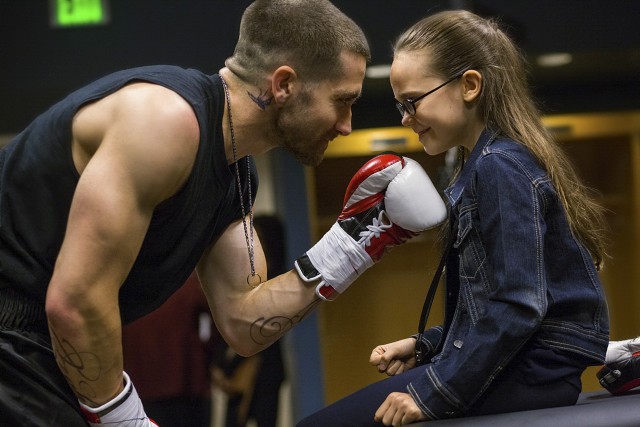Southpaw Movie Review

Southpaw is now available on home video. Read our review of the Blu-ray combo.
 |
Southpaw
Theatrical Release: July 24, 2015 / Running Time: 124 Minutes / Rating: R Director: Antoine Fuqua / Writer: Kurt Sutter Cast: Jake Gyllenhaal (Billy Hope), Forest Whitaker (Titus "Tick" Wills), Naomie Harris (Angela Rivera), Curtis "50 Cent" Jackson (Jordan Mains), Oona Laurence (Leila Hope), Skylan Brooks (Hoppy), Beau Knapp (Jon Jon), Rachel McAdams (Maureen Hope), Victor Oritz (Ramone), Rita Ora (Maria Escobar), Miguel Robin Gomez (Miguel "Magic" Escobar), Dominic Colon (Mikey), Malcolm Mays (Gabe), Patsy Meck (Judge Kayle) |
Buy Southpaw from Amazon.com: Blu-ray + DVD + Digital HD • DVD • Instant Video
For the second straight year, Jake Gyllenhaal has transformed himself physically for a movie role. Last year, it was slimming down to portray Nightcrawler's slimy, insomniac tabloid videographer, Gyllenhaal is Billy "The Great" Hope, an undefeated Light Heavyweight boxer who has risen from rags to riches. Having grown up in New York City's orphan system, Billy now has a loving wife (Rachel McAdams) and an admiring young daughter (Oona Laurence). He's worth millions and so is his house, a mansion that would drop the jaws of many movie stars and professional athletes. Billy is eager to defend his title against Miguel Escobar (Miguel Gomez), a Colombian fighter who is desperate for a shot at the belt. Billy's manager (Curtis "50 Cent" Jackson) doesn't want to schedule a bout, evidently concerned that the outcome could jeopardize the value of his prized cash cow.
How badly does Escobar want to square off with Billy? So badly that in the lobby of a charity event where Billy is delivering a keynote speech, a melee breaks out among the two boxers' respective entourages. A gun is fired, instantly producing an Act One tragedy that is sure to make critics debate with themselves whether or not describing it constitutes a spoiler. Since it appears in the one-sentence synopsis at the top of the film's IMDb page, I'm guessing it's fair game, but I'll allow others to ruin it for you.
Southpaw shows us just how quickly fame and fortune can disappear. Billy loses his wife, custody of his daughter, his beloved home, and his manager. Suspended from pro boxing for a year, bankrupt, and subject to random drug testing, Billy moves into a cramped apartment and reluctantly accepts a janitorial job at a nearby gym run by "Tick" Wills (Forest Whitaker), a wise sage with a cloudy left eye.
You know exactly where the movie is going from here. Billy Hope works hard to redeem himself, clawing his way back up to the top, earning custody of his daughter and a chance to fight the hothead he'll always associate with his life-shattering tragedy.
The feature screenwriting debut of "Sons of Anarchy" creator and "The Shield" scribe Kurt Sutter, Southpaw is absurdly contrived. Maybe it's partly because true stories are the basis for a few great boxing movies (e.g. Raging Bull and The Fighter), but the story Sutter has crafted is patently unrealistic and, past that highly improbable public tragedy, doggedly predictable.
Gyllenhaal tries hard to make you overlook the artificiality, committing to the role while adopting the vocal rhythms and attitude of Eminem, who contributes the terrible original song "Phenomenal" to a corny training montage. The actor's presence here and now applies a suggestion of weight and dramatic credibility that a more characteristically muscular actor like Channing Tatum or Dwayne Johnson would not. But, even with The Weinstein Company distributing and Gyllenhaal's weight gain generating buzz months in advance, the fact that this movie is opening wide from the get-go in late summer correctly indicates that this is not the prestige picture you might want.
That explains two things: why critics are likely to point out the formulaic movie's glaring faults and why moviegoers will likely not mind, buying into the movie's manipulative design. Gyllenhaal has never been a huge draw; even that elusive combination of high critical acclaim and public approval has failed to elevate his vehicles to commercially significant heights. You can attribute that to the actor not making blockbuster-type movies (apart from the resoundingly rejected Prince of Persia would-be franchise), but talented actors and filmmakers have been able to succeed with dramas comparable to his output, from American Sniper to Gone Girl to Unbroken. Since Persia's failure, Gyllenhaal has rarely collected huge paychecks, a fact that both lightens the weight on his shoulders and expresses a belief in the projects that his weight gains and losses testify to.
Judging from the reaction at my advance screening, which featured the most responsive crowd since Selma, people will love Southpaw. Whether the masses will actually see Southpaw remains to be seen. We will soon know if Southpaw stumbles like those two well-regarded movies. Director Antoine Fuqua, who has long displayed polished instincts if not quite proficiency, piles on boxing scenes, but at least stages them creatively, moving the camera around like a first-person fighter, a design that recalls but doesn't quite ape Raging Bull's ring scenes. Fuqua has scored back to back hits with Olympus Has Fallen and The Equalizer. Southpaw is a harder sell than those two action movies without being sophisticated, subtle, or intellectual enough for critics and critically thinking adults to embrace. Boxing movies that have performed well -- like Rocky, The Fighter, and Million Dollar Baby -- have typically done so with the blessings of critics on the path to major awards recognition. Southpaw seems unlikely to score on either of those fronts, thus putting the real onus on the general public and word of mouth.
Buy Southpaw from Amazon.com: Blu-ray + DVD + Digital HD / DVD / Instant Video
|
Related Reviews:
DVDizzy.com | DVD and Blu-ray Reviews | New and Upcoming DVD & Blu-ray Schedule | Upcoming Cover Art | Search This Site
DVDizzy.com Top Stories:
Boxing: The Fighter • Million Dollar Baby • Rocky • Annapolis • Grudge Match • Real Steel
Jake Gyllenhaal: Zodiac • Nightcrawler • Prince of Persia: The Sands of Time • Accidental Love
Directed by Antoine Fuqua: The Equalizer • Olympus Has Fallen • Brooklyn's Finest • Shooter • King Arthur
Forest Whitaker: Lee Daniels' The Butler • Good Morning, Vietnam • Platoon • Pawn • Vantage Point
Rachel McAdams: Morning Glory • Sherlock Holmes • Midnight in Paris | 50 Cent: All Things Fall Apart • Freelancers • Gun
Now in Theaters: Ant-Man • Terminator Genisys • Avengers: Age of Ultron • The Man from U.N.C.L.E.
Text copyright 2015 DVDizzy.com. Images copyright 2015 The Weinstein Company, Wanda Pictures, Riche Productions, Escape Artists, Fuqua Films.
Unauthorized reproduction prohibited.


